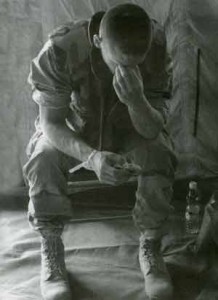 “Just make it go away!” Many of us can relate to this desire to escape or just get rid of a problem we are facing. At times circumstances in our lives can seem overwhelming. It is no wonder why many turn to substances (alcohol/drugs) or unhealthy levels of certain activities (shopping, gambling, eating, etc.), in order to try and cope with their circumstances.
“Just make it go away!” Many of us can relate to this desire to escape or just get rid of a problem we are facing. At times circumstances in our lives can seem overwhelming. It is no wonder why many turn to substances (alcohol/drugs) or unhealthy levels of certain activities (shopping, gambling, eating, etc.), in order to try and cope with their circumstances.
There is no escape. These things may provide a diversion. The reality of the problems still remain. Our attempts to alter the perception of reality do nothing to the real situation.
Is it possible to experience a peace, and the resulting clarity and strength, in the middle of whatever is happening?
YES! This has been my experience. And not my experience alone. Many followers of Jesus Christ report the same experience. One such follower is Paul, the Apostle. He wrote in his letter to the Christians at the city of Philippi in Asia Minor (modern day Turkey): “Do not worry about anything, but in everything by prayer and supplication with thanksgiving let your requests be made known to God. And the peace of God, which surpasses all understanding, will guard your hearts and your minds in Christ Jesus.” (Philippians 4:6, 7 – NRSV)
Sometimes we may confuse the idea of “prayer” with wish making or demands. St. Paul, in prison for his faith at the time of writing, expresses prayer as “requests”—not demands. When we use prayer as some magical wish or demand formula we miss the relational aspect God is offering.
God does not sit on high and only have an abstract connection with our suffering. He entered into our suffering. Jesus lived a life that included much suffering. He still enters our suffering every time we call upon Him.
People, in their freedom, may choose to hurt us. They may choose to do wrong to others for whom we care. At times there seems to be no shortage of people choosing to do hurtful acts. No matter what others choose to do; God will never leave us alone in our distress.
From my perspective I would rather God simply remove the problems, problem people, etc. However, God most often does not choose to violate our (or other’s) human freedom. At the same time He will provide all that we need to make it through the difficult environment we create for ourselves or others create that impacts our lives. His presence, strength, wisdom and peace are available to all who call upon the Name of the Lord.
If all our problems were removed then the peace Paul speaks of would not go “beyond understanding.” It is understandable to experience peace in the absence of conflict or adversity. A peace that “goes beyond understanding” is a peace experienced in the middle of turmoil and chaos.
In Part 2 we will consider some examples of experience God’s peace and provision in the midst of our troubles.
Question: Have you ever experience a peace that “goes beyond understanding”?




